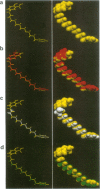Abstract
1. Salmeterol is a potent, selective and long acting beta 2-adrenoceptor agonist. In vitro, salmeterol exerts 'reassertion' relaxation of airways smooth muscle. Reassertion relaxation refers to the capacity of salmeterol to cause repeated functional antagonism of induced contraction when airway smooth muscle is intermittently exposed to, then washed free from, beta-adrenoceptor antagonists such as sotalol. The mechanism(s) underlying reassertion relaxation are unknown but may relate to high affinity binding of the long aliphatic side chain of salmeterol to an accessory site, distinct from the agonist recognition site, in or near the beta 2-adrenoceptor (exosite binding hypothesis). 2. In order to test the exosite hypothesis, three pure analogues of salmeterol, each exactly preserving the molecular structure of the aliphatic side chain but with zero or low efficacy at the beta 2-adrenoceptor were synthesized. The effect of pre-incubating guinea-pig tracheal smooth muscle with these analogues on salmeterol-induced reassertion relaxation was determined. 3. Computer Assisted Molecular Modelling of these molecules revealed that each of them exactly preserved the low energy linear conformation of the aliphatic side chain of salmeterol. Measurement of lipophilicity (octanol:water partition coefficient; log P) and direct partition into synthetic membranes (membrane partition coefficient; Kpmem) showed that all compounds had high affinity for lipids and membranes. In particular the biophysical properties of CGP 59162 (log P 1.89, Kpmem 16500) were very similar to salmeterol (log P 1.73, Kpmem 16800). 4. Two of the analogues, CGP 54103 and D 2543 (1 microM), which are structural mimics of the side chain of salmeterol, differing slightly in their length, did not prevent either the initial relaxation induced by salmeterol (0.1 microM) or the reassertion relaxation; however, it was not possible to determine whether either of these molecules occupied the beta 2-adrenoceptor. 5. The third analogue, CGP 59162, which has the substituents on the active saligenin head group of salmeterol in transposed positions, itself exerted a weak beta 2-adrenoceptor-mediated relaxation antagonized by ICI 118551 (beta 2-selective antagonist) but not CGP 20712 (beta 1-selective antagonist) and, at higher concentrations CGP 59162 caused reassertion relaxation suggesting that it may occupy and activate the beta 2-adrenoceptor in a manner analogous to salmeterol. 6. CGP 59162, at concentrations up to ten fold molar excess, did not prevent or reduce salmeterol-induced reassertion relaxation. 7. In conclusion these data are not consistent with the existence of a distinct 'exosite' recognising the aliphatic side chain of salmeterol mediating reassertion.
Full text
PDF
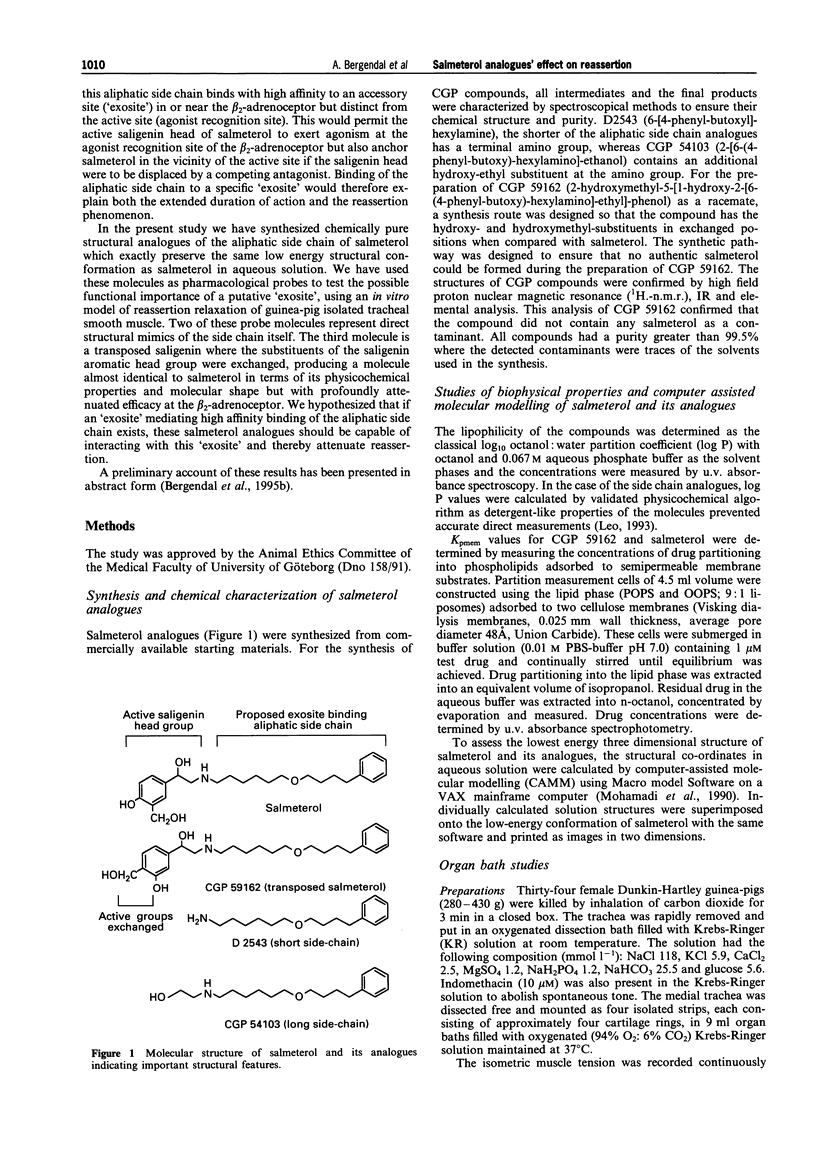
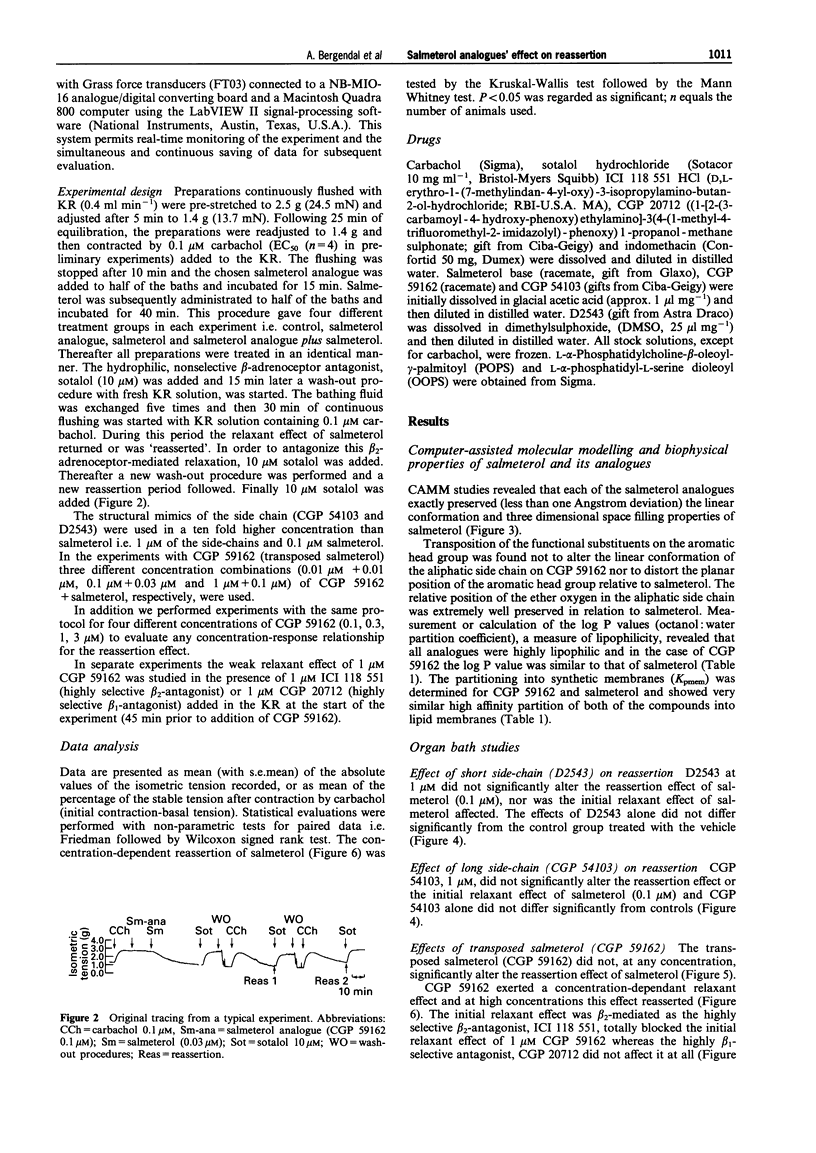
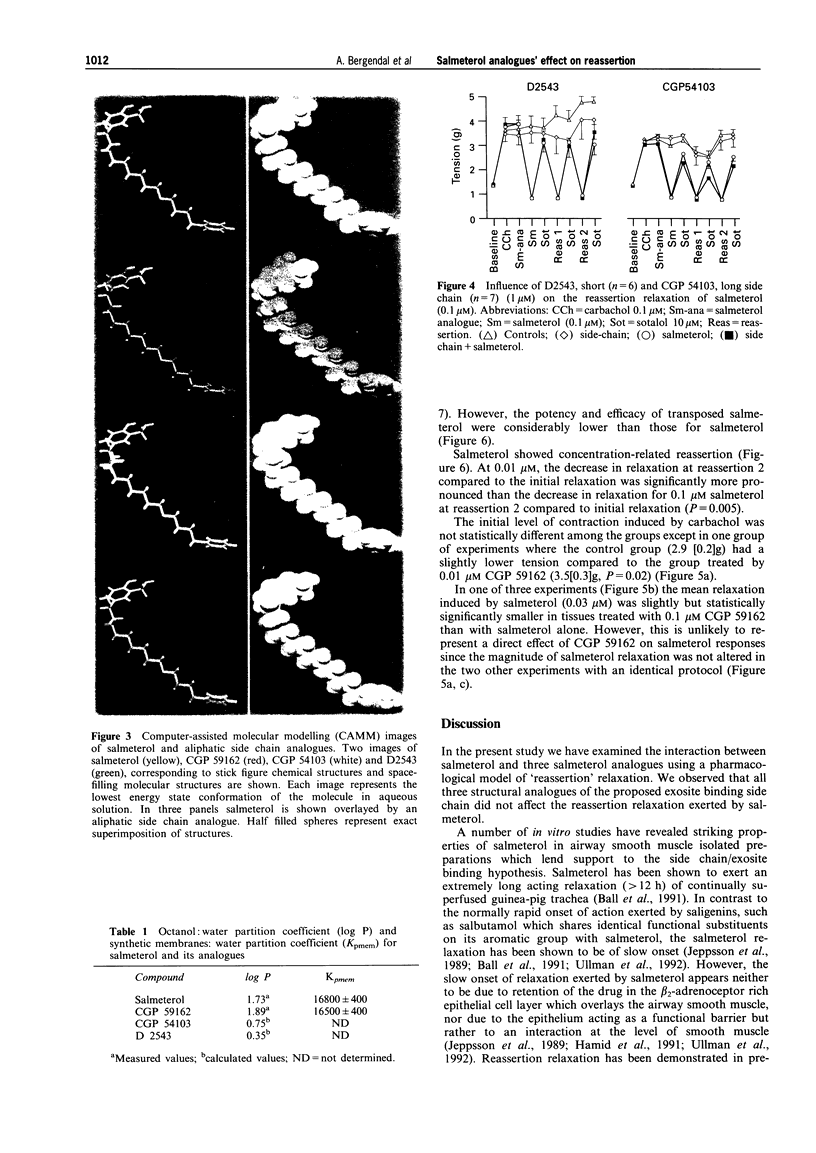
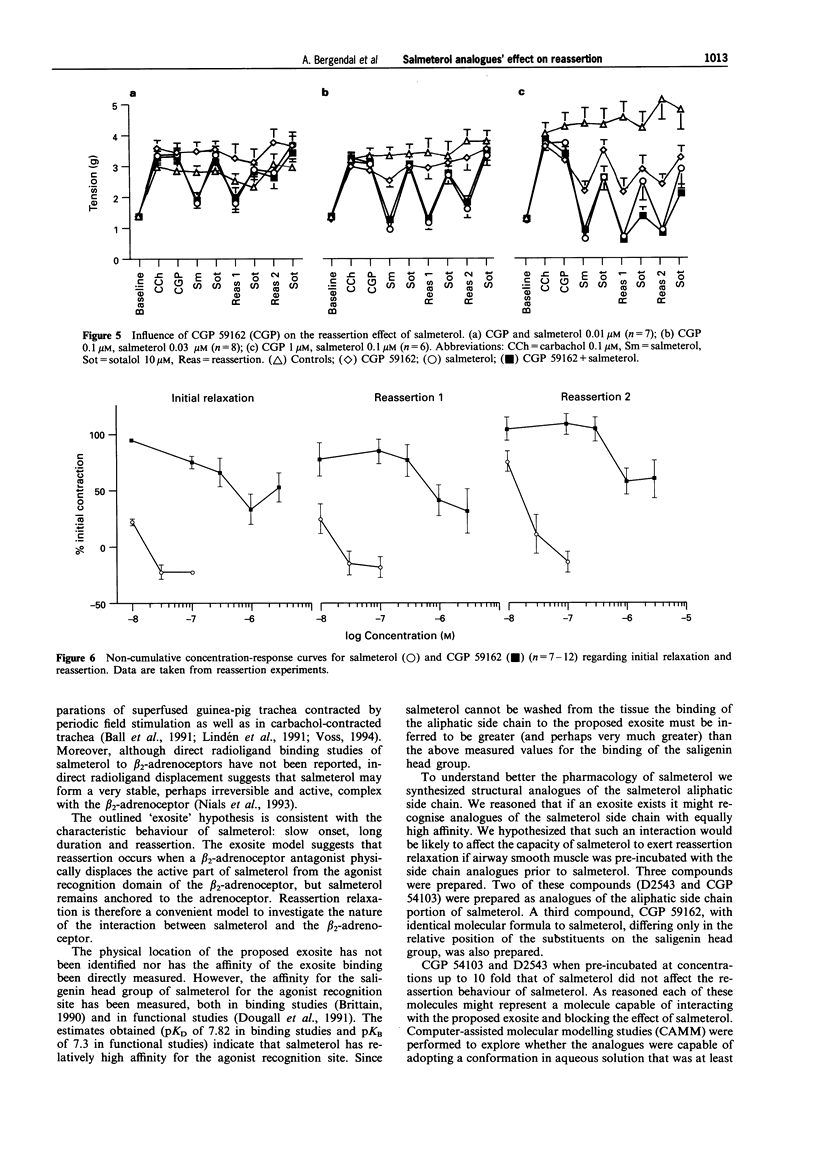
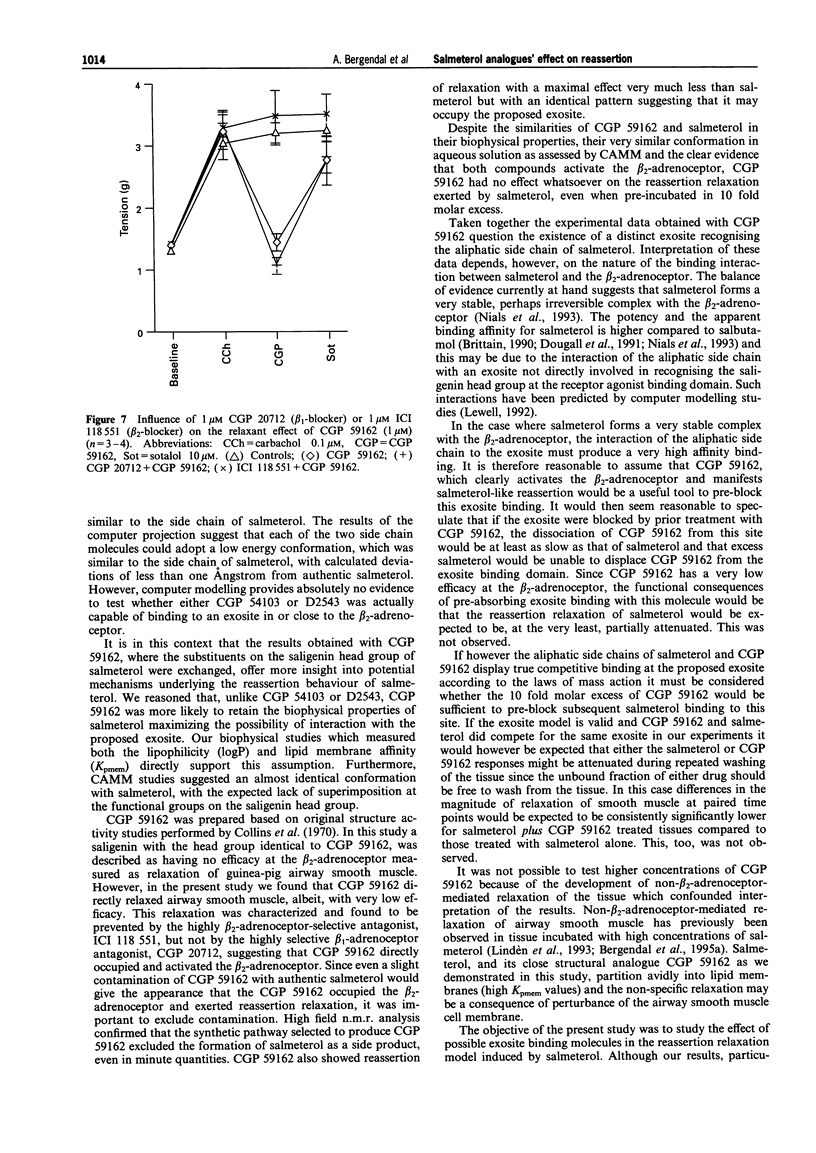

Images in this article
Selected References
These references are in PubMed. This may not be the complete list of references from this article.
- Anderson G. P., Lindén A., Rabe K. F. Why are long-acting beta-adrenoceptor agonists long-acting? Eur Respir J. 1994 Mar;7(3):569–578. doi: 10.1183/09031936.94.07030569. [DOI] [PubMed] [Google Scholar]
- Ball D. I., Brittain R. T., Coleman R. A., Denyer L. H., Jack D., Johnson M., Lunts L. H., Nials A. T., Sheldrick K. E., Skidmore I. F. Salmeterol, a novel, long-acting beta 2-adrenoceptor agonist: characterization of pharmacological activity in vitro and in vivo. Br J Pharmacol. 1991 Nov;104(3):665–671. doi: 10.1111/j.1476-5381.1991.tb12486.x. [DOI] [PMC free article] [PubMed] [Google Scholar]
- Bergendal A., Lindén A., Lötvall J., Skoogh B. E., Löfdahl C. G. Different effects of salmeterol, formoterol and salbutamol on cholinergic responses in the ferret trachea. Br J Pharmacol. 1995 Apr;114(7):1478–1482. doi: 10.1111/j.1476-5381.1995.tb13373.x. [DOI] [PMC free article] [PubMed] [Google Scholar]
- Brittain R. T. Approaches to a long-acting, selective beta 2-adrenoceptor stimulant. Lung. 1990;168 (Suppl):111–114. doi: 10.1007/BF02718122. [DOI] [PubMed] [Google Scholar]
- Collin D. T., Hartley D., Jack D., Lunts L. H., Press J. C., Ritchie A. C., Toon P. Saligenin analogs of sympathomimetic catecholamines. J Med Chem. 1970 Jul;13(4):674–680. doi: 10.1021/jm00298a022. [DOI] [PubMed] [Google Scholar]
- Dougall I. G., Harper D., Jackson D. M., Leff P. Estimation of the efficacy and affinity of the beta 2-adrenoceptor agonist salmeterol in guinea-pig trachea. Br J Pharmacol. 1991 Dec;104(4):1057–1061. doi: 10.1111/j.1476-5381.1991.tb12549.x. [DOI] [PMC free article] [PubMed] [Google Scholar]
- Hamid Q. A., Mak J. C., Sheppard M. N., Corrin B., Venter J. C., Barnes P. J. Localization of beta 2-adrenoceptor messenger RNA in human and rat lung using in situ hybridization: correlation with receptor autoradiography. Eur J Pharmacol. 1991 Feb 25;206(2):133–138. doi: 10.1016/0922-4106(91)90021-9. [DOI] [PubMed] [Google Scholar]
- Jeppsson A. B., Löfdahl C. G., Waldeck B., Widmark E. On the predictive value of experiments in vitro in the evaluation of the effect duration of bronchodilator drugs for local administration. Pulm Pharmacol. 1989;2(2):81–85. doi: 10.1016/0952-0600(89)90028-8. [DOI] [PubMed] [Google Scholar]
- Lewell X. Q. A model of the adrenergic beta-2 receptor and binding sites for agonist and antagonist. Drug Des Discov. 1992;9(1):29–48. [PubMed] [Google Scholar]
- Lindén A., Bergendal A., Ullman A., Skoogh B. E., Löfdahl C. G. Salmeterol, formoterol, and salbutamol in the isolated guinea pig trachea: differences in maximum relaxant effect and potency but not in functional antagonism. Thorax. 1993 May;48(5):547–553. doi: 10.1136/thx.48.5.547. [DOI] [PMC free article] [PubMed] [Google Scholar]
- Nials A. T., Sumner M. J., Johnson M., Coleman R. A. Investigations into factors determining the duration of action of the beta 2-adrenoceptor agonist, salmeterol. Br J Pharmacol. 1993 Feb;108(2):507–515. doi: 10.1111/j.1476-5381.1993.tb12833.x. [DOI] [PMC free article] [PubMed] [Google Scholar]
- Pearlman D. S., Chervinsky P., LaForce C., Seltzer J. M., Southern D. L., Kemp J. P., Dockhorn R. J., Grossman J., Liddle R. F., Yancey S. W. A comparison of salmeterol with albuterol in the treatment of mild-to-moderate asthma. N Engl J Med. 1992 Nov 12;327(20):1420–1425. doi: 10.1056/NEJM199211123272004. [DOI] [PubMed] [Google Scholar]
- Ullman A., Bergendal A., Lindén A., Waldeck B., Skoogh B. E., Löfdahl C. G. Onset of action and duration of effect of formoterol and salmeterol compared to salbutamol in isolated guinea pig trachea with or without epithelium. Allergy. 1992 Aug;47(4 Pt 2):384–387. doi: 10.1111/j.1398-9995.1992.tb02076.x. [DOI] [PubMed] [Google Scholar]
- Ullman A., Svedmyr N. Salmeterol, a new long acting inhaled beta 2 adrenoceptor agonist: comparison with salbutamol in adult asthmatic patients. Thorax. 1988 Sep;43(9):674–678. doi: 10.1136/thx.43.9.674. [DOI] [PMC free article] [PubMed] [Google Scholar]



